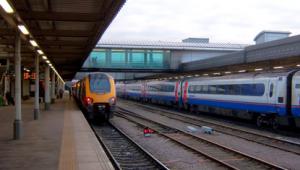18 August 2006
A senior member of the government's Pensions Commission is set to investigate a £350m retirement fund deficit across Britain's railways sector to help prevent national strikes on the network, Public Finance can reveal.
Jeannie Drake, a member of the Equal Opportunities Commission who worked alongside Adair Turner to develop a blueprint for Britain's future pensions systems, has been approached to chair an examination into railway staff pensions.
Although the railways pension industry is estimated to be worth £17bn, two-thirds of schemes are currently in debt and fewer staff are paying into funds. Railway unions were poised for a summer of strikes unless staff concerns over their retirement funds were investigated; some had already balloted members.
Drake has been asked by rail sector employers and the unions to suggest solutions, although, as PF went to press, she had not fully confirmed her involvement. However, a senior source said that Drake was likely to chair a three-member commission charged with producing a framework to reduce deficits and proposing future contribution systems.
PF understands that Bryn Davies, director of Union Pensions Services, will represent the trades unions on the commission and an as yet unnamed representative from the rail network's employers will complete the membership.
The commission will also assess union proposals to reduce the number of railway pension funds from 99 to three; moves that employers such as Network Rail have opposed.
However, Gerry Doherty, general secretary of the TSSA union, has said that the 'vast majority of industry employers supported the creation of the pensions commission'.
A briefing note from the four main railways unions – the RMT, Aslef, TSSA and Amicus – reveals that staff are 'extremely concerned at the threat to the future of the Railways Pension Scheme (Railpen)' after a valuation published in 2005 revealed deficits of £350m nationally. Around two-thirds of funds were estimated to have 'significant shortfalls'.
RMT general secretary Bob Crow told PF: 'The ballot result demonstrated quite clearly that our members were prepared to take action to prevent their pension benefits being undermined. The commission will give the various components of the industry an opportunity to discuss and try to resolve the very real problems that threaten to overwhelm the RPS.'
Railway employers, who cover 60% of RPS costs (scheme members cover 40%), are the latest public sector-linked bodies to experience pension difficulties. Local government, police, fire service, health and education bodies have also had to re-examine their retirement structures in recent years.
Rail employers have suggested increasing their own and employee contributions to shore up funds. One industry senior executive said: 'We're conscious that overcoming the pension difficulties that the industry faces requires joint working through the commission.'
But unions have warned against costly requirements that discourage staff from joining schemes and lead to an exodus of existing members – requiring higher contributions from fewer future members
PFaug2006


















